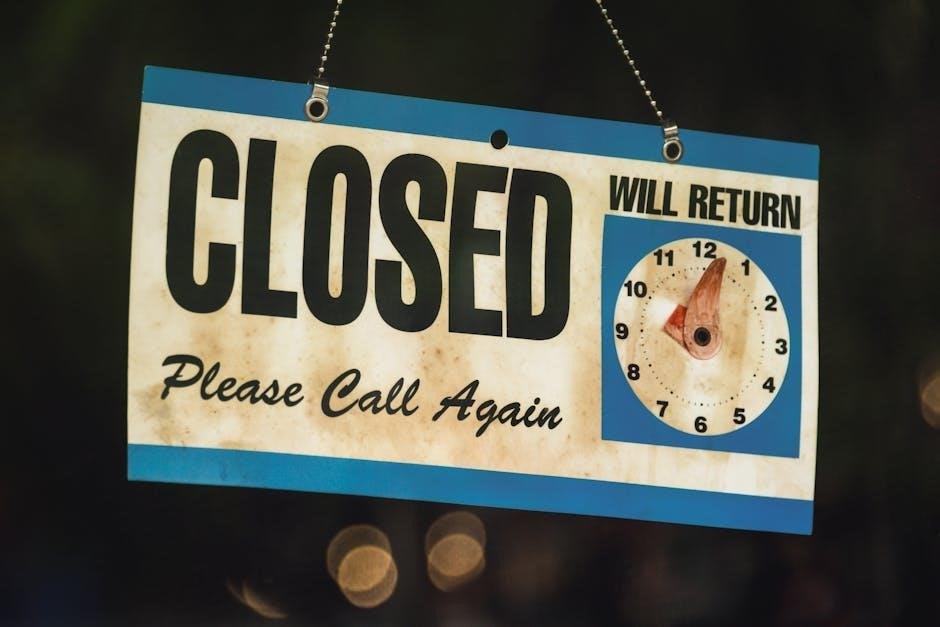Overview of the Notice of Intent to Lien in Colorado
The Colorado Notice of Intent to Lien is a required document informing property owners of potential liens due to unpaid debts. It must be served at least 10 days before filing a mechanics lien‚ ensuring contractors’ rights are protected on private projects.

Legal Requirements for Filing a Notice of Intent
The Notice of Intent must be served at least 10 days before filing a mechanics lien‚ as required by Colorado Revised Statutes Section 38-22-109(3). This step is mandatory to secure lien rights and must strictly adhere to the specified timeframe and procedures.
2.1. Timeframe for Serving the Notice
The Notice of Intent to Lien in Colorado must be served at least 10 days before recording a mechanics lien. This timeframe is non-negotiable and failure to comply can invalidate the lien. The notice serves as a formal warning to the property owner‚ providing them an opportunity to settle unpaid debts before legal action proceeds. Importantly‚ serving the notice does not extend the deadline for filing the mechanics lien itself‚ which must be recorded within 4 months of the last work performed or materials furnished. Contractors must carefully manage timelines to ensure compliance with Colorado’s strict lien laws and avoid potential disputes or loss of lien rights. Proper timing is crucial to maintain the validity of the claim and protect the contractor’s interests.
2.2. Eligibility to File the Notice
In Colorado‚ eligibility to file a Notice of Intent to Lien is restricted to lien claimants who have provided labor‚ materials‚ or services for a construction project. This includes contractors‚ subcontractors‚ and suppliers. The claimant must have a direct contractual relationship with the owner or a party with whom they have a contractual agreement. To be eligible‚ the claimant must also have unpaid balances for work performed or materials furnished. The notice cannot be filed for disputed amounts or as a precautionary measure. Additionally‚ the claimant must be in compliance with all statutory requirements‚ including proper licensing and adherence to filing deadlines. Ensuring eligibility is a critical step to avoid dismissal of the lien claim and maintain legal standing in pursuing payment through Colorado’s lien laws.

The Process of Serving the Notice
Serving the Notice of Intent to Lien requires strict adherence to Colorado’s legal methods‚ such as certified mail or personal delivery‚ ensuring proof of service is obtained.
3.1. Methods of Service
The Notice of Intent to Lien in Colorado must be served through legally accepted methods‚ such as certified mail with return receipt or personal delivery to the property owner. Service by mail ensures proof of delivery‚ while personal delivery guarantees direct notification. Additionally‚ service can be completed by leaving the notice at the owner’s residence or place of business with a person of suitable age; Proper documentation‚ such as an affidavit of service‚ is required to confirm that the notice was delivered in accordance with Colorado law. These methods ensure the property owner is formally notified of the potential lien‚ maintaining the integrity of the legal process and protecting the claimant’s rights. Adhering to these methods is crucial for the notice to be valid and enforceable.
3.2. Proof of Service Requirements
Proof of service is essential for validating the delivery of the Notice of Intent to Lien in Colorado. Acceptable methods include certified mail with a return receipt or an affidavit of service signed by the person who delivered the notice. The affidavit must detail the time‚ date‚ and manner of service‚ as well as the identity of the person served. For mail delivery‚ the return receipt serves as official proof. Colorado law requires that these documents be filed alongside the Notice of Intent to ensure compliance. Proper documentation is critical to uphold the legal validity of the notice and subsequent lien filing. Failure to provide adequate proof of service may result in delays or dismissal of the lien claim. Accurate and timely submission of these records is therefore paramount to protect the claimant’s rights under Colorado’s mechanics lien laws.
Importance of the Notice for Contractors
The Notice of Intent to Lien is a critical tool for contractors in Colorado to protect their payment rights. It serves as a formal warning to property owners‚ alerting them to potential lien filings if unpaid debts remain unresolved. This notice creates a sense of urgency‚ encouraging prompt payment and reducing the likelihood of prolonged disputes. For contractors‚ it ensures that their contributions to a project are recognized and compensated‚ maintaining cash flow and business stability. By filing this notice‚ contractors demonstrate their commitment to resolving payment issues amicably while preserving their legal options. It also safeguards their interests by establishing a clear record of unpaid claims‚ which is essential for pursuing further legal action if necessary. Ultimately‚ the Notice of Intent to Lien is a vital step in securing fair compensation for work performed or materials supplied.

Consequences of Filing the Notice
Filing the Notice of Intent to Lien in Colorado has significant consequences that must be carefully considered. If the notice is not served correctly or timely‚ it could result in the loss of lien rights‚ compromising a contractor’s ability to secure payment. Conversely‚ properly filing the notice can prompt payment from the property owner or other responsible parties‚ avoiding costly legal battles. Additionally‚ once the notice is filed‚ it creates a public record‚ which may impact the property owner’s credit and ability to secure future financing. Contractors must ensure compliance with all legal requirements to avoid penalties and maintain their standing in court. The notice also sets a clear path for resolving payment disputes‚ emphasizing the importance of adherence to Colorado’s lien laws.
Accessing the Colorado Notice of Intent to Lien PDF Form
The Colorado Notice of Intent to Lien PDF form is available on the official Colorado government website and other legal resources‚ ensuring easy access for contractors.
6.1. Where to Find the Form
The Colorado Notice of Intent to Lien PDF form can be easily accessed through the Colorado Secretary of State’s website or other official government portals. Additionally‚ it is available on legal document platforms and construction industry resources.
Contractors and claimants can also find the form on websites specializing in construction lien law or by contacting local legal aid offices. Ensure the form is downloaded from a reliable source to maintain its legality and accuracy.
Some legal supply stores and attorney offices may provide copies of the form‚ but the most convenient method is through official online platforms. Always verify the form’s compliance with Colorado Revised Statutes before use.
6.2. How to Fill Out the Form
To complete the Colorado Notice of Intent to Lien PDF form‚ start by filling in the claimant’s information‚ including their name‚ address‚ and contact details. Next‚ provide a detailed property description‚ such as the legal address or description of the property where the work was performed.
List the amount due and specify the services or materials provided. Include the dates of service and the names of parties involved‚ such as the property owner or general contractor. Ensure all information is accurate and aligns with Colorado lien laws.
Sign and date the form‚ and attach any required affidavits or proofs of service. Double-check all entries for accuracy before submission to avoid delays or legal issues. If unsure‚ consult a legal professional for assistance.
Deadline for Filing the Mechanics Lien
In Colorado‚ the deadline for filing a mechanics lien is within 4 months from the date when you last performed work or furnished materials to the project. This timeframe is strictly enforced‚ and missing it can result in the loss of your lien rights. The 4-month period begins on the date of the last labor‚ service‚ or material provided to the property. It is critical to track this date accurately‚ as it determines the filing deadline. The Notice of Intent to Lien does not extend this deadline‚ so contractors must ensure timely filing. Properly recording the lien within this window is essential to secure payment rights and avoid legal complications.

Common Mistakes to Avoid When Filing
One of the most common mistakes is missing the 10-day deadline for serving the Notice of Intent before filing a mechanics lien. Contractors often overlook this critical timeframe‚ leading to invalid liens. Another error is failing to properly serve the notice to all required parties‚ such as the property owner or general contractor‚ which can result in legal challenges. Additionally‚ some contractors neglect to file the mechanics lien within the 4-month deadline from the last date of work or material provision‚ forfeiting their lien rights. Improper completion of the Notice of Intent form‚ such as missing signatures or incomplete property descriptions‚ can also render the document invalid. Ensuring accurate service‚ timely filing‚ and strict adherence to legal requirements is essential to avoid these pitfalls.
The Colorado Notice of Intent to Lien is a critical step for contractors to protect their rights in unpaid construction projects. Serving the notice at least 10 days before filing a mechanics lien ensures compliance with state laws. Proper service‚ accurate documentation‚ and adherence to deadlines are essential to avoid invalidation. Contractors must also file the mechanics lien within 4 months of their last work or material provision. Common mistakes‚ such as missed deadlines or improper service‚ can lead to lost lien rights. Seeking legal advice can help navigate complexities and prevent errors. Understanding and following Colorado’s lien laws is vital for securing payment and maintaining project integrity. Failure to comply can result in financial losses‚ emphasizing the importance of careful preparation and timely action.